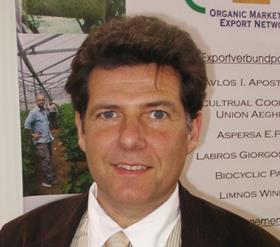
Dr Johannes Eisenbach is the coordinator of Greece’s Organic Marketing & Export Network (OMEN). Established in 2002, the cooperation brings together organic farmers' organisations and packhouse facilities all over Greece. The network functions as an export partnership representing about 1,000 organic farmers involved in crops such as citrus, grapes and vegetables.
How did you first get into the fresh produce business?
JE: I am the son of a farmer and studied agriculture at Giessen University, in Germany, before serving my apprenticeship on two farms.
Having coordinated a Greek-Turkish research project, I wrote my PhD thesis on the competitiveness of the Greek fresh produce industry on the international market.
What roles do you have at OMEN?
JE: I am responsible for sales, logistics, quality assurance, monitoring and technical support for our producers. My involvement begins at farm level and ends with talking with the bookkeeping departments of our customers.
Where did you work before?
JE: Before I started to export fresh organic produce, I worked at a company that produced, bottled and exported organic olive oil. I was responsible for organising the organic production project with about 200 farmers.
At the same time, I started experimenting in producing compost with olive cake and olive leaves. The results were so encouraging that in 1996 I set up a compost plant in Kalamata, which is now part of our Network and provides biocyclic compost in bags to organic farmers all over Greece and even to Cyprus.
I also conducted research and trial cultivation projects with the German bio-pioneer Adolf Hoops (1931-1999), who spent winters with us in Kalamata for four years, offering his knowledge on organic-biocyclic vegetable cultivation techniques adapted to the Greek climate. He laid the groundwork for organic vegetable production in Greece.
We are now collaborating with his son Arne on the “Biocyclic Guidelines” and “Biocyclic Standards” (www.biocyclic.net), which we started in 2007 to implement for many of OMEN’s citrus producers.
What's the first thing you do when you sit down at your desk?
JE: I read my emails, look online for all the latest organic market news and then check the weather forecast for our production areas throughout Greece.
Where have you been lately and where are you planning to go next?
JE: I have to travel a lot. Recently I was in Bulgaria for a new large-scale organic grape project, and in Nuremberg, where we had a booth at Biofach.
What do you love in particular about your job and what, if anything, would you change?
JE: I love the fact that with every truck we sell we are supporting organic agriculture, which means we are a step closer to creating a healthier environment and a better future.
Awareness is the thing that should change. Hunting for the cheapest offers is leading agriculture onto a dangerous highway. It should be obvious to all that organic agriculture helps to avoid environmental pollution and is good for health. Both are services that one has to pay for.
In the long run, a slightly higher price for organic products is much cheaper than the costs of repairing the environment or taking care of the many nutrition-based illnesses.
What do you do to unwind after a tough day at work?
JE: I walk my dog in the olive groves around my house and I play the oboe in a chamber music ensemble with my wife and other musicians from the Kalamata Conservatory.






No comments yet